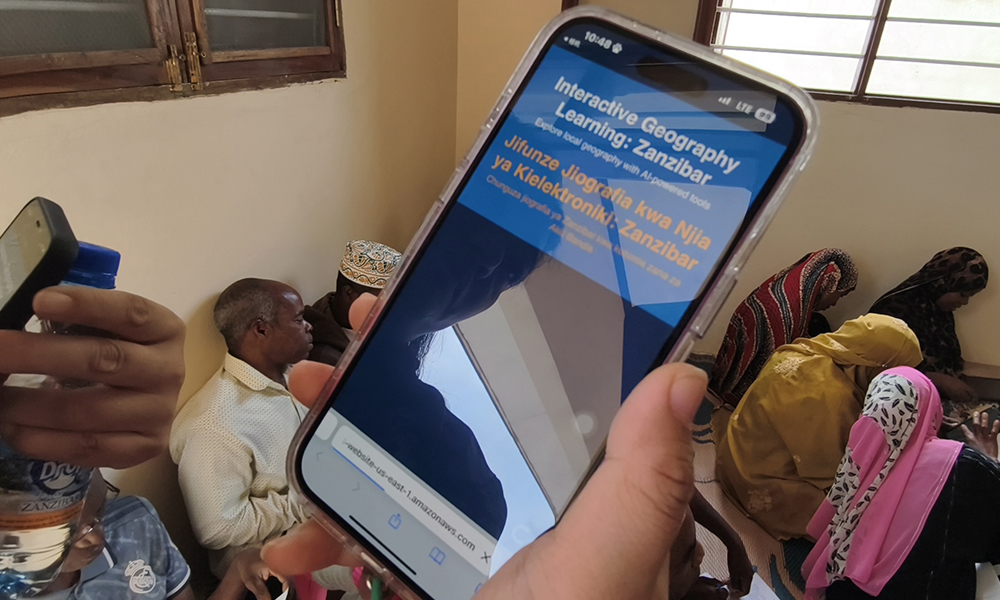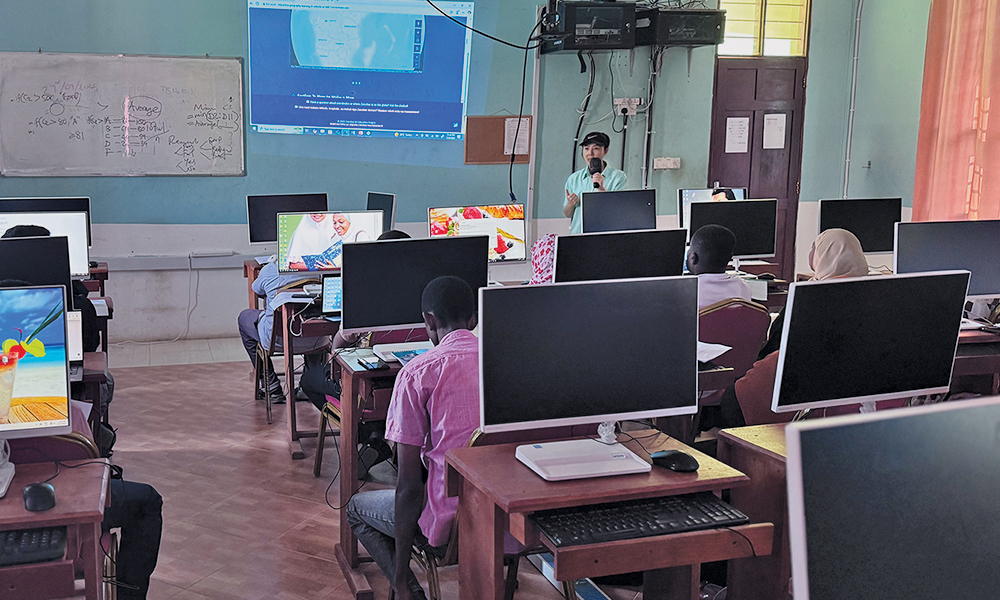Professor authors textbook to teach about generative AI
Featured Stories
SUMMARY: Dr. Xuebin Wei has published a textbook about generative AI, data analytics and programming. He also published video tutorials on his YouTube channel to introduce the textbook; facilitated online and in-person workshops through the University Consortium for Geographic Information, alongside textbook co-author Dr. Xinyue Ye; and designed a course for adult learners in Zanzibar.
Dr. Xuebin Wei was looking to offer a new approach to cloud-computing resources when he led the writing of a textbook on generative artificial intelligence.
Published in December 2024 by CRC Press, an imprint of Routledge, the book, Social Data Analytics in the Cloud with AI, integrates cloud computing and generative AI into social data analytics education, providing students and professionals with a comprehensive guide to leverage transformative technology.
Wei, an associate professor in the College of Integrated Science and Engineering, partnered on the book with Dr. Xinyue Ye of the University of Alabama. “We believe this is a great textbook, timely now, for data analysis with generative AI and also cloud computing,” Wei said.
Although the book shares some similarities with others that teach data analytics and programming, Wei said the textbook is unique in its focus on cloud computing. It teaches about cloud data storage provider MongoDB and platforms like Amazon Web Services and GitHub. “They are all the leading platforms in those areas, so students can access the latest technology and also the most powerful computers without needing local infrastructure,” Wei said. “They can just access everything with a browser, so they can use that with their laptops.”
Providing students with these resources is also an asset for JMU.
“We don’t need to buy that software, because we are either using the education license or we are using a free license that [the publisher] provided,” Wei said. “This reduces costs, since we don’t need to maintain expensive, high-powered computers on campus.
“The second part is using the generative AI,” he continued, “because generative AI is both a hot topic and an emerging technology.” As students move through JMU’s data analytics courses, they’ll learn about generative AI starting in programming and carrying through data collection, data processing and querying, and by using AI to build interactive dashboards.
“Everything becomes much easier for students,” Wei said. Instead of spending time writing complicated Python code or SQL code, they can leverage generative AI to generate that code. “This allows students and analysts to spend more time thinking about the real problems that they’re interested in and they can resolve more efficiently — while still being responsible for verifying the accuracy of the AI-generated results.”

Though Wei holds a doctorate in Geography, he has various research interests that include social data analytics; integrating AI into teaching and research; and using generative AI for data science, education and geospatial analysis.
Now in his 10th year at JMU, Wei led the writing of the textbook after being encouraged by co-author Ye, the Endowed Shelby Distinguished Professor in Geospatial Artificial Intelligence at the University of Alabama and a fellow of both the American Association of Geographers and the Royal Geographical Society.
“He encouraged me to write this book, because he knows that many social science analysts don’t have a strong Python programming background,” Wei said. “And many also lack a strong database background.”
Wei hopes the textbook will build students’ knowledge and confidence in using generative AI with cloud-computing resources to increase their analysis output. “Most students don’t need to spend a lot of time mastering complex Python coding or SQL skills. They need to learn the basics, but they’re still responsible for verifying the results.”
Wei based the content of his book on his teaching materials from the past 10 years, drawing from several key classes:
- Data Mining, Modeling and Knowledge Discovery
- Introduction to Programming and Data Science
- Visualization Methods, Technologies and Tools for Intelligence Analysis
- Introduction to Artificial Intelligence and Machine Learning for Intelligence Analysis
In addition to writing the textbook, Wei has facilitated online and in-person workshops through the University Consortium for Geographic Information Science, alongside Ye. He also published video tutorials on his YouTube channel to introduce the textbook.
Wei recently worked with three colleagues from around the world on a collaborative experiment that took place in Zanzibar, a semi-autonomous region of Tanzania, Africa. There, the team compared traditional instruction with an AI-powered, geography-education course that Wei designed. The course, Geospatial Foundations for Zanzibar’s Adult Learners, integrates AI-generated video, interactive story maps and chatbots to explore how AI can improve learning outcomes and engagement in low-resource settings.

Part of the educational team in Zanzibar were Dr. Xiao Huang from Emory University’s College of Arts and Sciences; Dr. Siqin Wang from the University of Southern California’s Dornsife College of Letters, Arts and Sciences; and Li Xianyi, associate professor of Chinese language and literature with the Sino-Africa Youth Foundation.
“We worked with the SAY Foundation, a local NGO in Zanzibar that has strong connections with schools,” Wei explained. “For the project, we searched public content from the internet, combined it into a structured knowledge base, and then used AI to generate instructional videos with avatars and build a chatbot that could provide accurate answers in both English and Swahili.”
The team has also applied for funding to support the Zanzibar education team, he said. “We hope to gain broader support so we can promote those AI-powered educational resources to more people, especially because they don’t have enough teachers. The local Department of Education and the schools are very interested. They all want to be part of that project in Zanzibar.”
One of Wei’s goals for working with generative AI is to make data analysis easier and faster. “For example, in the past, if we wanted to analyze Twitter data, we had limited resources, such as traditional machine-learning models,” he said. “But now we can analyze each individual tweet in depth. We can translate tweets into different languages, quickly generate summaries, extract entities from images and conduct a wide range of analyses.”
Other universities can freely access the textbook through their institutional libraries, and Wei said the book has already had a broad reach and impact. “Since its publication, it has been downloaded more than 800 times globally in the first eight months.”
